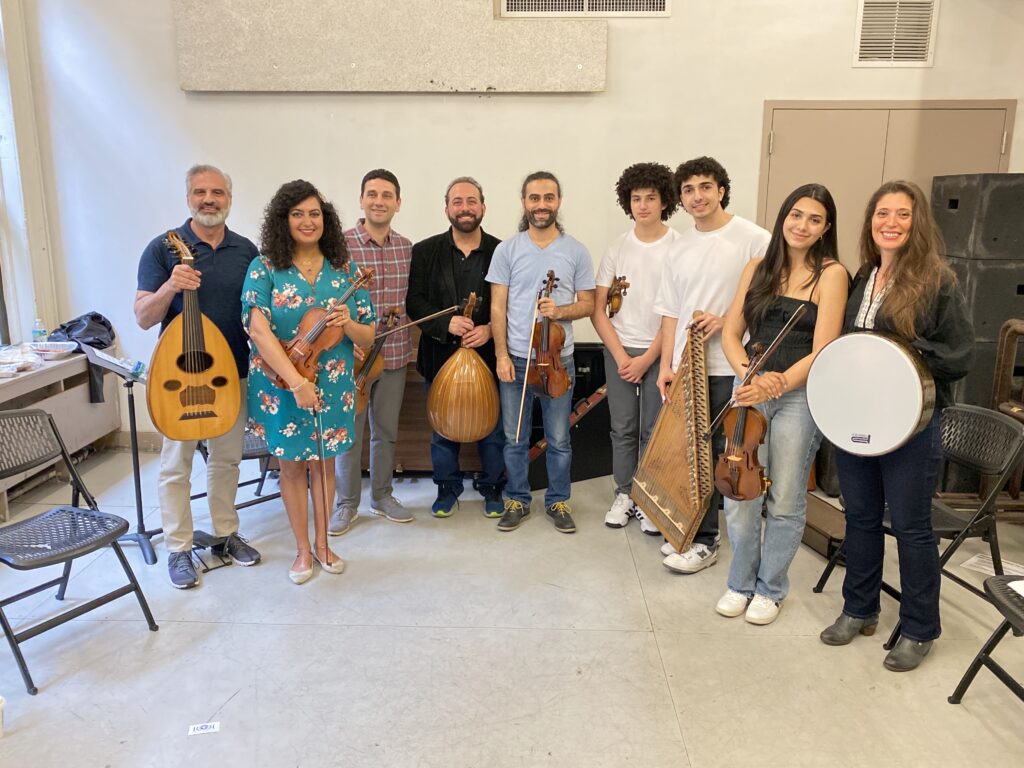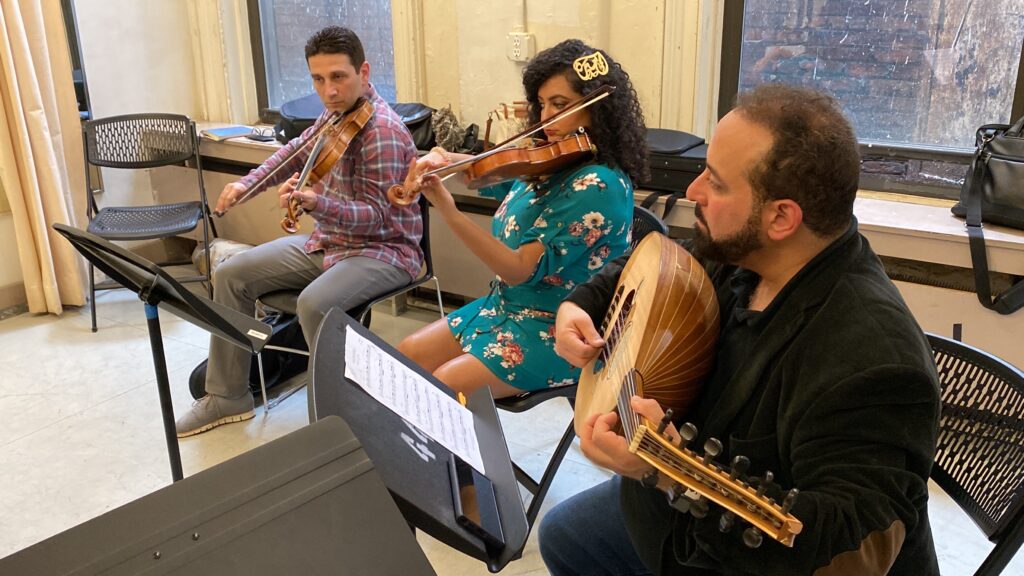By Stephanie Meditz
news@queensledger.com
Astoria residents Samer Ali and Marissa Arciola Ali work to preserve traditional Syrian music in the Queens community and beyond.
On May 19 at 8 p.m., the Syrian Music Preservation Initiative (SMPI) will celebrate its fifth anniversary with “Love and Loss: Classical Music of Syria” at Carnegie Hall’s Weill Recital Hall.
The concert will feature SMPI’s Takht al-Nagham, an Arab chamber music ensemble that includes the violin, oud (Arab lute), qanun (Arab zither), ney (Arab flute), bass and riq (tambourine).
It will include both instrumental and vocal pieces sung by a soloist and a small choir.
The music selections will mostly consist of pieces that are not well-known in the United States.
“Some of these pieces are composed recently in the old format, some of them are old pieces. We’re performing a piece from 1936 by a very important composer from Latakia in Syria,” SMPI founder and artistic director Samer Ali said in an interview. “We also have a new piece that was composed in 2009 by a different composer from the same town.”
There are regional differences in Syrian music — music from cities has a distinct sound compared to music from the countryside or a coastal area.
“You can see that in the tuning of the notes, actually. The experienced ear can hear the differences,” he said. “When you play a Kurdish song, the tuning of the song is very different from the tuning from a coastal area.”
The music also reflects Syria’s ethnic diversity.
Syria has a predominantly Arab population, but it also includes Kurdish, Armenian and Syriac traditions.
“It’s different groups and different cultures that add to the richness of the music of Syria,” Ali said.
As a reflection of the music’s rich cultural tradition, the concert will highlight musicians from diverse backgrounds.
“It’s an interesting mix of both Arab and non-Arab musicians and singers. Actually, some of our singers don’t speak Arabic at all but they will be singing in Arabic,” SMPI president Marissa Arciola Ali said in an interview.
Performers include Syrians and non-Syrian Arabs, as well as people from Latin America, Europe and other places around the world.
“That really is a good example of what SMPI is. Even our volunteers are international,” she said.
SMPI’s mission is to preserve the diverse traditional music of Syria through performances, education and free online transcriptions and translations.
Founded by Ali in 2018, SMPI began as a music group to bring music written and played in Syria to the New York stage.
Eventually, the group got the idea to do more than just perform and started to provide resources to make Syrian music accessible to people all over the globe.
“We started the organization to preserve this music tradition and to keep it alive,” Ali said. “Music traditions are to be practiced, and the practice is what is the essence of it.”
They provide transcriptions and translations of different pieces for free on their website.
“If it’s an instrumental piece, then it’s easy for anyone who reads music to work on it. If it’s a vocal form, then we present it in a way that the transcription has the Arabic reading on it. So that involves someone who can read the Arabic alphabet,” Ali said.
When SMPI presents a vocal piece in concert, they translate the work into both Arabic and English for the audience.
“This is not easy, because translating poetry is a tough mission. So we work with translators who are also sometimes poets to provide a good translation, the same way when you go to an opera in Italian to be provided in Italian and English. We do the same thing,” he said.
They also try to provide the context, story and musical analysis of the works they perform to enhance the audience’s understanding.
“The music… is transcribed from people listening. And then from there, sometimes it’s written down, hand-written and then we translate it into Sibelius. It’s a big process,” Arciola Ali said.
SMPI’s target audiences include both people who are well-versed in the tradition and those who are curious to learn more about and possibly play Syrian music.
For their upcoming concert at Carnegie Hall, SMPI opened one of the pieces for the public to audition.
Rehearsals for this piece then doubled as workshops when Ali reviewed the details and tuning of each piece, as well as its musical character.
“This piece is both so interesting and so good for learning because it shows the different sides of the maqam [scale] and how you would use it if you wanted to solo, or if you wanted to play the whole thing,” Arciola Ali said.
SMPI works not only to expose audiences to Syrian music, but to make it easier for those interested in playing it to do so.
“This is a very aural tradition. Usually, you would learn songs from your teacher, but since that’s not available to everyone, especially today, we are in the process of making more and more pieces available online,” she said.
After the devastating earthquake in Syria and Turkey in February, SMPI brought together several musicians and dancers from the local Arabic music scene for a fundraiser at City Lore.
They raised more money than they anticipated and donated it to the Syrian American Medical Society (SAMS).
“Syria, the country, is going through tough times since 2011, and it’s getting worse. People in the country are busy with basic life needs,” Ali said. “We try to help with this because if this music is not practiced and documented, then it’s going to be forgotten,”
Tickets are available for SMPI’s May 19 Carnegie Hall performance at https://www.carnegiehall.org/calendar/2023/05/19/love-and-loss-traditional-music-of-syria-0800pm.
To learn more about and volunteer with the Syrian Music Preservation Initiative, visit their website at https://syrianmusic.org.
“It’s also very rewarding, just to know that we’re not only creating music with people who are excited to create music and building a community, but doing it for a good cause, which is keeping this music alive,” Arciola Ali said.

At the upcoming Carnegie Hall performance on May 19, a group of community members selected through an audition process will join SMPI onstage.



